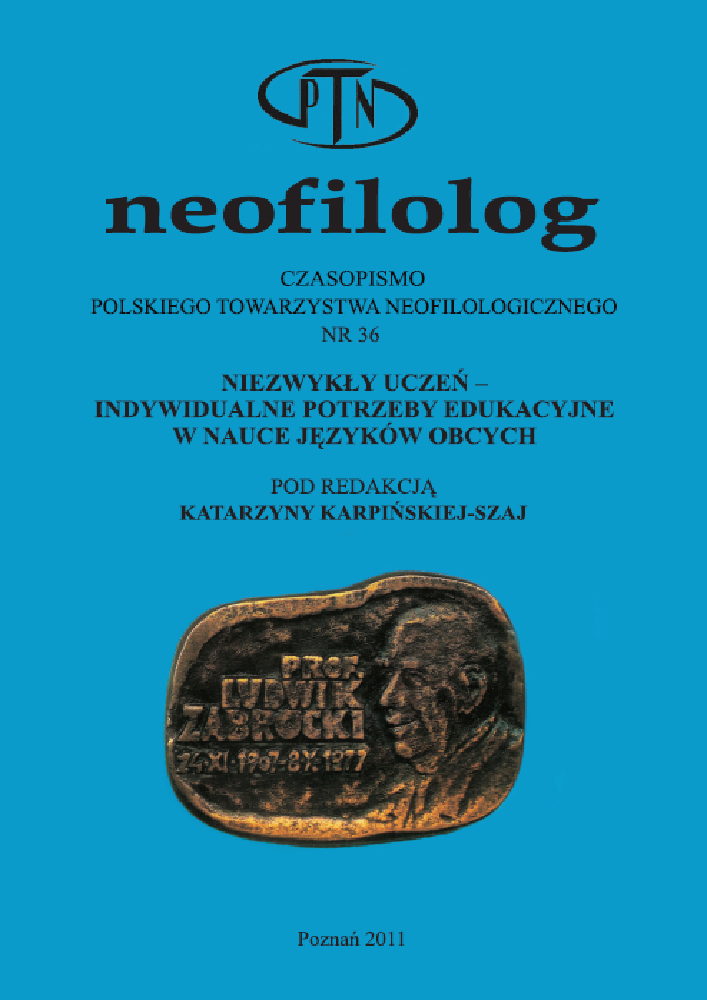Abstract
The paper presents an overview of issues pertaining to teaching foreign languages to pupils with Asperger syndrome at school. Following a brief background to the impairments, it proceeds to discuss the significance of learning foreign languages by pupils with Asperger syndrome as it can lead to beneficial effects on their overall development. The article also analyses the profile of attitudes, knowledge and skills of foreign language teachers working with Asperger syndrome learners. The paper finishes with an attempt to depict the main difficulties that Asperger syndrome pupils and their teachers face during foreign language classes and to present strategies for intervention.
References
Attwood, T. 2006. Zespół Aspergera. Wydawnictwo Zysk i S-ka.
Attwood, T. 2007. „Zespół Aspergera i jego leczenie”, w: Kutscher, M. L., Attwood, T. i Wolff, R. R. (red.). Dzieci z zaburzeniami łączonymi. Warszawa: K. E. Liber. 127-152.
Baso, F. 2008. Children with Asperger’s Syndrome in primary school: difficulties with foreign language learning. http://hilarymccoll.co.uk/resources/FabriziaBaso.pdf.
Besnard, C. 2008. Can High Functioning Autistic Children Learn More Than One Lan-guage? http://www.cmcgc.com/Media/HANDOUTS/081022/070.pdf
Department for Education and Skills i North West Regional Special Educational Needs Partnership. 2004. Children with autism: strategies for accessing the curricu-lum: modern foreign languages. http://www.teachernet.gov.uk/_doc/6701/ modern%20foreign%20languages.pdf
Główny Urząd Statystyczny. 2008. Oświata i Wychowanie w roku szkolnym 2007/2008. Warszawa: Informacje i opracowania statystyczne. http://www.stat.gov.pl/cps/rde/xbcr/gus/PUBL_PUBL_wz_oswiata_wychowanie_2007-2008r.pdf
Główny Urząd Statystyczny. 2010. Oświata i Wychowanie w roku szkolnym 2009/2010. Warszawa: Informacje i opracowania statystyczne. http:// www.stat.gov.pl/cps/rde/xbcr/gus/PUBL_e_oswiata_i_wychowanie_2009-2010.pdf
Jennings, P. A. i Greenberg, M. T. 2009. „The Prosocial Classroom: Teacher Social and Emotional Competence in Relation to Students and Classroom Outcomes”. Review of Educational Research (79) 1. 491-525.
Karpińska-Szaj, K. 2005. „Przygotowanie nauczycieli języków obcych do pracy w klasach integracyjnych”, w: Karpińska-Szaj, K. (red.). Nauka języków obcych w dobie integracji europejskiej. Łask: Oficyna Wydawnicza LEKSEM. 179-188.
Kummant, M. 2008. Raport. Tendencje w kształceniu integracyjnym w Polsce w latach 2003-2008. Warszawa: Pracownia Wspomagania Rozwoju i Integracji CMPPP. ftp://ftp.cmppp.edu.pl/cmppp_e-books/raport%20%205%20letni%20na% 20stron%EA.pdf
Kurcz, I. 2005. Psychologia języka i komunikacji. Warszawa: Wydawnictwo Naukowe Scholar.
Lumsden, J. 2009. „Modern Languages and Autism”. Scottish Languages Review 19. 13-20.
Matczak, A. 2007. Kwestionariusz Kompetencji Społecznych. Podręcznik. Warszawa: Pracownia Testów Psychologicznych.
Młynarska, M. 2008. Autyzm w ujęciu psycholingwistycznym. Terapia dyskursywna a teoria umysłu. Wrocław: Wydawnictwo Uniwersytetu Wrocławskiego.
Pisula, E. 2008. „Dziecko z zespołem Aspergera”, w: Cytowska, B., Winczura, B. i Stawarski, A. (red.). Dzieci chore, niepełnosprawne i z utrudnieniami w rozwoju. Kraków: Oficyna Wydawnicza Impuls. 375-387.
Rose, K. R. i Kasper, G. (red.). 2001. Pragmatics in Language Teaching. Cambridge: Cambridge University Press.
Smith, N. V. i Tsimpli, I. M. 1995. The mind of a savant: language learning and mod-ularity. Oxford: Basil Blackwell.
Święcicka, J. 2010. „Nieproste życie z Aspergerem (cz. 1)”. Psychologia w szkole 1. 92-98.
Winter, M. 2006. Zespół Aspergera. Co nauczyciel wiedzieć powinien. Warszawa: Frasz-ka Edukacyjna.
Wire, V. 2002. Learning a second language — everyone’s right or not right for everyone. http://www.languageswithoutlimits.co.uk/autism.html
Wire, V. 2005. „Autistic Spectrum Disorders and learning foreign languages”. Support for Learning (20)3. 123-128.
Zawadzka-Bartnik, E. 2010. Nauczyciel języków obcych i jego niepełnosprawni uczniowie (z zaburzeniami i dysfunkcjami). Kraków: Oficyna Wydawnicza Impuls.
License
Copyright (c) 2011 Małgorzata Kolera

This work is licensed under a Creative Commons Attribution-NoDerivatives 4.0 International License.
Authors
Authors of texts accepted for publication in Neofilolog are required to complete, sign and return to the Editorial team’s office the Agreement for granting a royalty-free license to works with a commitment to grant a CC sub-license.
Under the agreement, the authors of the texts published in Neofilolog grant Adam Mickiewicz University in Poznań a non-exclusive, royalty-free license and authorize the use of Attribution-NoDerivatives 4.0 International (CC BY-ND 4.0) Creative Commons sub-license.
The authors retain the right to the free disposal of the work.
Users
Interested Internet users are entitled to use works that have been published in Neofilolog since 2017, under the following conditions:
▪ attribution – obligation to provide, together with the distributed work, information about the authorship, title, source (link to the original work, DOI) and the license itself.
▪ no derivatives – the work must be preserved in its original form. Without the author's consent, it is not possible to distribute the modified work in the form of translations, publications, etc.
Copyrights are reserved for all texts published since 2017.
Miscellaneous
Adam Mickiewicz University in Poznań retains the property right as a whole (layout, graphic form, title, cover design, logo etc.).
